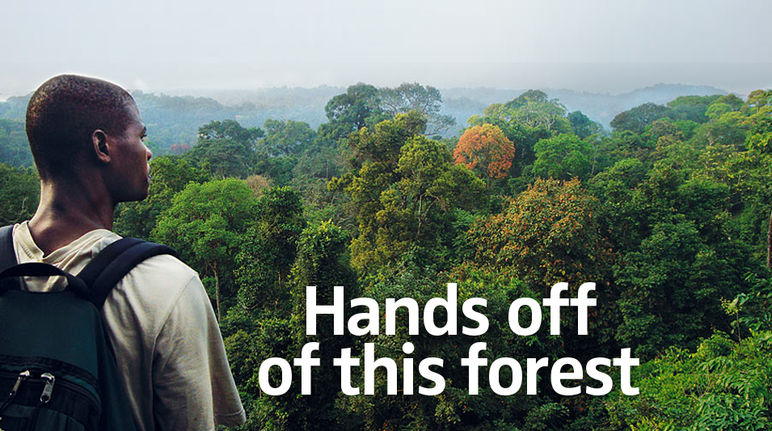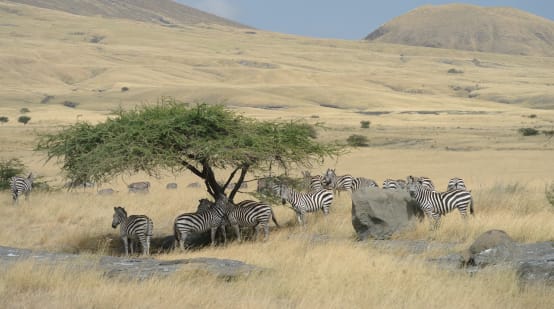Keep oil palm plantations out of this forest!
 Cameroon needs biodiversity, not green deserts: much of the country is still covered by dense rainforest
Cameroon needs biodiversity, not green deserts: much of the country is still covered by dense rainforest
New York-based investors are eyeing Cameroon’s rainforests for industrial-scale oil palm plantations. U.S. diplomats strong-armed the Cameroonian government into pushing the project through against the will of the local people, who are fighting to keep the bulldozers at bay. Tell Cameroon to reject the project once and for all.
News and updates Call to actionTo: the government of Cameroon, President Paul Biya and ministers
“Reject the U.S. investors' plans for oil palm plantations in the rainforest once and for all.”
“They bulldozed everything ... I feel like dying, I have nothing else but this land,” explains a villager in Cameroon whose land was grabbed by the plantation company.
U.S. investors want to establish 73,000 hectares of industrial oil palm plantations in southwestern Cameroon in a rainforest surrounded by four protected areas.
In 2009, New York-based Herakles Farms LLC, represented by its subsidiary SG Sustainable Oils Cameroon Ltd. (SGSOC), signed a 99-year lease agreement with the government of Cameroon – without bothering to inform the people living in the affected area.
The Herakles Farms–SGSOC palm oil project is built on lies, fraudulent contracts, dubious permits and illegal practices, writes an international coalition of environmental organizations. U.S. diplomats intervened to push the project through by leaning heavily on three government ministers and President Paul Biya, writes the Oakland Institute in its study, “Backroom Bullying: The Role of the United States Government in the Herakles Farms’ Land Grab in Cameroon”.
In November 2013, the initial land lease was reviewed by presidential decree and the concession was reduced to slightly less than 20,000 hectares of land for a probationary period of three years. Of that area, the company has only managed to clear 882 hectares of rainforest to date thanks to the resistance of local people, conservation groups and NGOs.
We now have the chance to defeat the palm oil project and save tens of thousands of hectares of forest once and for all by stopping the renewal of the probationary lease. Please help preserve the home of humans and animals, including endangered species such as chimpanzees and other primates. Tell the government of Cameroon to do the right thing – let’s not let this opportunity pass.
BackgroundFurther reading:
Environmental Investigation Agency (EIA): Palm Oil Plantation in Cameroon: An Opportunity to Stop “The Wrong Project in the Wrong Place”, press release and video, October 2016
Oakland Institute: Backroom Bullying: The Role of the United States Government in the Herakles Farms’ Land Grab in Cameroon, September 2016
Greenpeace: Herakles Farms project rears its ugly head again, November 2015
Rainforest Rescue: Environmentalists in Cameroon need your support, petition, October 2014
CNBC: The life and death of a master of the universe, June 2014
Oakland Institute: Herakles Exposed: the Truth behind Herakles Farms’ False Promises in Cameroon, September 2012
To: the government of Cameroon, President Paul Biya and ministers
Dear President Biya, Ladies and Gentlemen,
I am deeply concerned about the Herakles Farms–SGSOC oil palm plantation project in the rainforests of southwestern Cameroon. Please scrap the project once and for all by not renewing the company’s probationary land lease.
Please protect your country’s unique natural treasure and return the leased land to the local population.
Sincerely,
The issue – rainforest on our dinner tables and in our fuel tanks
At 66 million tons annually, palm oil is the most commonly produced vegetable oil. Its low world market price and properties that lend themselves to processed foods have led the food industry to use it in half of all supermarket products. Palm oil can be found in frozen pizzas, biscuits and margarine, as well as body creams, soaps, makeup, candles and detergents.
Few people realize that almost half of the palm oil imported into the EU is used as biofuel. Since 2009, the mandatory blending of biofuels into motor vehicle fuels has been a major cause of deforestation.
Oil palm plantations currently cover more than 27 million hectares of the Earth’s surface. Forests and human settlements have been destroyed and replaced by “green deserts” containing virtually no biodiversity on an area the size of New Zealand.
The impact – suffering and death in producer countries, climate havoc
The warm, humid climate of the tropics offers perfect growth conditions for oil palms. Day after day, huge tracts of rainforest in Southeast Asia, Latin America and Africa are being bulldozed or torched to make room for more plantations, releasing vast amounts of carbon into the atmosphere. As a consequence, Indonesia – the world’s largest producer of palm oil – temporarily surpassed the United States in terms of greenhouse gas emissions in 2015. With their CO2 and methane emissions, palm oil-based biofuels actually have three times the climate impact of traditional fossil fuels.
Palm oil is not only bad for the climate: As their forest habitat is cleared, endangered species such as the orangutan, Borneo elephant and Sumatran tiger are being pushed closer to extinction. Smallholders and indigenous people who have inhabited and protected the forest for generations are often brutally driven from their land. In Indonesia, more than 700 land conflicts are related to the palm oil industry. Human rights violations are everyday occurrences, even on supposedly “sustainable” and “organic” plantations.
As consumers, we are largely unaware of these broader issues, yet our daily palm oil consumption also impacts our health: refined palm oil contains large amounts of harmful fatty acid esters that are known to damage DNA and cause cancer.
The solution – a revolution on our dinner tables and in our fuel tanks
Only 70,000 orangutans still roam the forests of Southeast Asia, yet the EU’s biofuels policy is pushing them to the brink of extinction. Every new plantation on Borneo is destroying a further piece of their habitat. Stepping up the pressure on policymakers is a must if we want to save our tree-dwelling kin. Apart from that, however, there is still a lot we can do in day-to-day life.
Follow these simple tips to recognize, avoid and combat palm oil:
- Enjoy a home-cooked meal: Use your imagination: why not try almond-coconut-pear biscuits? Or pizza with potato and rosemary? A meal cooked from fresh ingredients beats processed foods containing palm oil every time. Oils such as sunflower, olive, rapeseed or flaxseed are ideal for cooking and baking.
- Read labels: As of December 2014, labeling regulations in the EU require food products to clearly indicate that they contain palm oil. However, in the case of non-food items such as cosmetics and cleaning products, a wide range of chemical names may still be used to hide the use of palm oil. A quick check of your favorite search engine will turn up palm oil-free alternatives, however.
- Remember that the customer is king: Ask your retailers for palm oil-free products. Write product manufacturers and ask them why they aren’t using domestic oils. Companies can be quite sensitive to issues that give their products a bad name, so inquiring with sales staff and contacting manufacturers can make a real difference. Public pressure and increased awareness of the problem have already prompted some producers to stop using palm oil.
- Sign petitions and write your elected representatives: Online campaigns put pressure on policymakers responsible for biofuels and palm oil imports. Have you already signed all of Rainforest Rescue’s petitions?
- Speak out: Protest marches and creative action on the street raise public and media awareness of the issue, which in turn steps up the pressure on policymakers.
- Leave your car at home: Whenever you can, walk, ride a bicycle or use public transport.
- Be informed and inform others: Big Business and governments would like us to believe that biofuels are good for the climate and that oil palm plantations are sustainable. Spread the word – share this information with your family and friends and encourage them to rethink their consumption habits. It’s in our hands!














 Recent successes
Recent successes